THE FIRST THREE TESTS IN THE WILDERNESS; THE FINAL TESTS OF THE LAMB
FIRST WILDERNESS TEST: LEARNING HOW TO LIVE THE EXCHANGED LIFE
Today our readings show the children of Israel facing their first tests in the wilderness. They are out of Egypt, but Egypt is not yet out of them. Egypt, in this instance, symbolizes the domain of darkness, the place where God’s people are held captive in the world system, are slaves to the ways of the sin nature (the flesh), and subjects to the ruler of the age, Satan (2 Cor 4:4; Col 1:13).
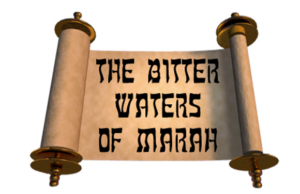 In the afterglow of their miraculous deliverance from their tormentors in which “the horse and riders were thrown into the Sea” while the children of Israel passed through that Sea on dry ground, Miriam leads the women in a song of triumph (Exodus 15:19-21).
In the afterglow of their miraculous deliverance from their tormentors in which “the horse and riders were thrown into the Sea” while the children of Israel passed through that Sea on dry ground, Miriam leads the women in a song of triumph (Exodus 15:19-21).
Then, within a short period of three days during which the children of Israel are tested with thirst, the music has turned to murmuring. The singing has turned to slander. The hearts of rejoicing have turned to hearts of rebellion.
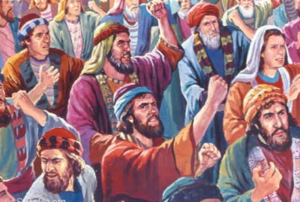 God delivered the children of Israel from the Egyptians and brought them out of Egypt by grace. Now He was going to illustrate that “only by grace can we enter” into the promised land.
God delivered the children of Israel from the Egyptians and brought them out of Egypt by grace. Now He was going to illustrate that “only by grace can we enter” into the promised land.
Between Egypt and the entrance into the Promised land of Canaan would lie a stretch of wilderness-wandering lasting 40 years. The New Testament teaches us that these historic episodes are for our instruction (1 Cor. 10:11). Jesus said that these lessons have to do with our relationship to Him (John 6:32-35). The apostles confirm this.
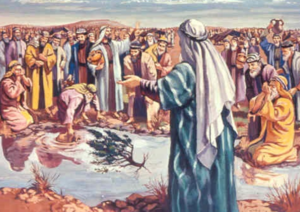 There are three days between the Red Sea crossing and the first test at Marah (the place of the bitter waters). We learned that the immersion of the children of Israel with Moses into the Red Sea was a picture of believers being “baptized into Christ”, identified through a ‘faith-union’ with Christ in His death and resurrection. (Romans 6:3-4; 1 Cor 10:1).
There are three days between the Red Sea crossing and the first test at Marah (the place of the bitter waters). We learned that the immersion of the children of Israel with Moses into the Red Sea was a picture of believers being “baptized into Christ”, identified through a ‘faith-union’ with Christ in His death and resurrection. (Romans 6:3-4; 1 Cor 10:1).
Once having passed through the Red Sea, the people of God are on ‘resurrection ground’, no more legal subjects of the Pharaoh of this world, nor were they in bondage any longer to the hard task masters of sin. No longer do we cower in fear before death that once threatened us. Our deliverance was an act of God’s grace; so our survival in the wilderness must also be an act of grace.
Once we have passed from death to life, we realize that there is nothing ‘from this world’ that truly satisfies our thirst or hunger. We are in a “dry and weary land where there is no water” (Psalm 63:1). We will look in vain for refreshment that will quench our thirst unless we look to the One who says, “If anyone is thirsty, let him come to Me and drink” (John 7:37) “Whoever drinks of the water that I give him will never be thirsty again” (John 4:14).
The first lessons for Christians (“in Christ” ones) from the children of Israel’s wilderness wanderings teach us to appropriate Christ as our satisfaction. Apart from Christ, all becomes unpalatable to our taste. In itself, the wilderness experience is lifeless. It is ‘Marah’, which means ‘bitter’.
Moses cries out to the Lord and the Lord shows him a tree. The ‘tree’ speaks of the person and work of Christ. In reading through the Bible, we have already discovered that Jesus is the Blessed Man of Psalm 1. “He is like a tree firmly planted by streams of water, which yields its fruit in its season and its leaf does not wither.” (Psalm 1:3). The tree was according to the law, the place where the death penalty was to be executed (Deut 21:22). It is a picture of ‘the cross’.
1 Peter 2:24 (NKJV) 24 who Himself bore our sins in His own body on the tree, that we, having died to sins, might live for righteousness–by whose stripes you were healed.
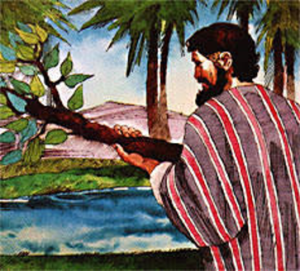 The Lord showed Moses a tree that was already there. This reminds us of the miracle of God opening our eyes and showing us what is already there- The truth of Who Jesus is and what He has done to pay our penalty for sin on the cross that we might have life.
The Lord showed Moses a tree that was already there. This reminds us of the miracle of God opening our eyes and showing us what is already there- The truth of Who Jesus is and what He has done to pay our penalty for sin on the cross that we might have life.
Water speaks of life (John 4:14; Rev 7:17, 21:6; 22:1). It also speaks of God’s Word (John 6:63; Eph 5:24). And it is only through the appropriation of the cross (reckoning on our death to self in Christ) that the bitter water can be made sweet.
The first lesson for the one who follows Jesus on resurrection ground is to take up their cross daily (Luke 9:23). Take up what God has shown you by the revelation of His Word about your being crucified with Christ and you will experience the refreshment of His life:
Galatians 2:20 (NASB) 20 I have been crucified with Christ; and it is no longer I who live, but Christ lives in me; and the life which I now live in the flesh I live by faith in the Son of God, who loved me and gave Himself up for me.
Learning to live “The Cross Life”, “the exchanged life”, where “it is no longer I who live, but Christ who lives in me,” is the only way we can live satisfying lives in this wilderness.
At this first place of testing, the healed waters of Marah, God lets His people know that they are subject to His government. They are no longer subject to the laws of Pharaoh, but they are not to live lawlessly. Although the Law had not yet been given, their love for God should cause them to ‘listen carefully to the Lord’, ‘do what is right in His eyes’ (and not just what is right in their own), pay attention to His commands (which will be forthcoming) and keep all His decrees. If they do this, the Lord says, “I will not bring on you any of the diseases I brought on the Egyptians, for I am the Lord who heals you.”
This is the first mention of healing in the Bible. It is given in context of God giving His people the revelation of His good government. His law, and our careful application of it will keep us from the judgments that fell upon the Egyptians. The Lord then reveals more about His character in introducing His Name, “Yahweh Rapha”; “I am the Lord who heals you.”
The Name is misinterpreted by some who believe that because the Lord heals (which He does) we are not to turn to any other means for healing (such as doctors, medicine, nutrition or therapies) but instead resort only to prayer when sick. The very context of this verse shows that the Lord can and often does use other means for healing as our Healer. At His instruction Moses was to apply a natural resource, a tree, and put it in the waters. In 2 Kings 2:19-22, Elisha was to use salt. Hezekiah was told to prepare a poultice of figs (2 Kings 20:7). Timothy was to use a little wine for medicinal purposes (1 Tim 5:23). The Scriptures also affirm that helping someone have a cheerful heart can promote healing (Proverbs 17:22).
THE SECOND WILDERNESS TEST: LEARNING TO APPROPRIATE WHAT GOD SUPPLIES
After this episode at Marah, the children of Israel are led to a beautiful oasis called Elim. This is a picture of the bountiful provisions for God’s people when they take up their cross- twelve springs and seventy palms trees. Notice as we read through the Bible how often we have the repetition of the numbers 12 and 70 for the people of God. (Jacob’s descendants and Jesus’ disciples).
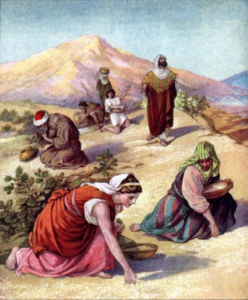
Not only were the children of Israel tested by a lack of accessible water in the wilderness, but also a lack of food. How do you feed so great a multitude (over 2 million people) where there is no food at hand?
A miracle of food production takes place. Jesus refers to this after He miraculously multiplies the fish and the loaves to feed the multitudes that followed him to a secluded place.
John 6:32-35 (NASB) 32 Jesus then said to them, “Truly, truly, I say to you, it is not Moses who has given you the bread out of heaven, but it is My Father who gives you the true bread out of heaven. 33 “For the bread of God is that which comes down out of heaven, and gives life to the world.” 34 Then they said to Him, “Lord, always give us this bread.” 35 Jesus said to them, “I am the bread of life; he who comes to Me will not hunger, and he who believes in Me will never thirst”.
Jesus takes the picture of the manna from heaven and applies it to Himself. As those who have crossed from death to life by virtue of our being identified with Christ in His death, burial and resurrection, we are to learn to live feeding on Him every day. This is our work- to believe on Him; to affirm and appropriate what He has given to us in terms of His provisions and His promises.
John 6:48-51 (NASB) 48 “I am the bread of life.49 “Your fathers ate the manna in the wilderness, and they died. 50 “This is the bread which comes down out of heaven, so that one may eat of it and not die. 51 “I am the living bread that came down out of heaven; if anyone eats of this bread, he will live forever; and the bread also which I will give for the life of the world is My flesh.”
Just as with the manna in the wilderness, we need to take the supply that Jesus offers of Himself and learn to feed on Him. We do this through the Word, fellowship with believers, communing with Him in prayer, and participating with Him in ministry.
MORE FACTS ABOUT THE MANNA
- The manna was a gift from God. The Lord said, “I will rain down bread from heaven.” (Ex 16:4)
- It was something that the natural man could not comprehend. They named it, manna, meaning, “what is it?” (Ex. 16:15; 1 Cor 2:14)
- It was to be collected and eaten. It was not to be merely admired, or looked at, but taken internally as personal nourishment from God. We take the Word to ourselves and make it our own. He is not just ‘the Savior’, He is My Savior.” He is not just “The Shepherd,” He is “My Shepherd”.
- They were to gather as much as they need and not keep any for the next day or it would rot. How important it is that we have ‘fresh bread’ from the Lord each morning.
- The Lord commands that they should demonstrate that their trust is in Him by gathering only for six days and resting on the seventh. For forty years (Exodus 16:35) there would be the miracle of God’s distinctive weekly clock. No manna was to be found on the ground the seventh day. There would be enough that could be gathered on the sixth day to last for two. Only the manna stored on the sixth day would not rot if kept overnight.
- It was kept in the ark of the Testimony (Exodus 16:33-34), which housed other items that spoke of Christ: the rod that budded, a testimony of Christ as the Resurrection and the Life (John 11:25) , the tables of the law, as a picture of Jesus fulfilling righteousness (Matt 5:17) and the pot of manna, a picture of Jesus as The Bread of Life (John 6:35).
THIRD WILDERNESS TEST- BE THANKFUL FOR GOD’S MERCY AND THE SPIRIT OF GRACE (HEB 10:29) – WATER OUT OF THE ROCK
Once again, the children of Israel are thirsty. They are reluctant to admit that they are disbelieving God, even though it is the pillar of cloud leading then. Instead they quarrel with Moses.
The Apostle Paul tells us that the Rock at Horeb represents Christ (1 Cor 10:4). Moses strikes the rock once and water comes out for the people to drink. This picture is of the rock being struck once by death. The once and for all sacrifice of Christ crucified will make possible the water of spiritual drink (the gift of the Holy Spirit given at Pentecost).
Instead of getting what we deserve for our murmuring and quarreling, God gives us rivers of mercy due to the righteousness of Another- Christ who was crucified for us.
TODAY’S READING IN THE NEW TESTAMENT: Matthew 22:1-33
The Parable of the Wedding Banquet of The King’s Son gives us a strong warning about being too busy that we do not respond to the invitations to honor Christ, commune with God’s people and experience the kingdom of heaven.
The excuses might have sounded reasonable if this were not a divine invitation. “After all,” they might say, “I have work to do.” One went to his field and another to his business. (Matt 22:5).
Jesus continues to give reference to the elders of Jerusalem who are about to consent to his death by describing through this parable how past messengers of the King, the prophets, had been treated in Israel. “The rest seized his servants, mistreated them and killed them.” (Matt 22:6).
The gospel invitation went to the Jews first, as they were the custodians of the law and the oracles of God (the prophecies). The religious leaders who should have known better, for they claimed to be experts in the Law, were, for the most part, rejecting the invitation to repent of their sins and come to honor the wedding of the King’s Son.
The king extends the invitation to the street corners where common people received the message gladly. Even some of the lowly and despised citizens, such as the prostitutes and tax collectors were among them.
An invitation to the Wedding included wedding garments which the guest was to wear. Wearing the clothes was the sign of having received an official invitation. It speaks of being clothed with the garments of salvation, the righteousness of Christ.
When one man shows up at the wedding without wearing the wedding garment, he is bound, cast into outer darkness where there will be weeping and gnashing of teeth.
Jesus then explains the gospel as being a call to all (For many are called). The Gospel is the power of God for salvation to everyone who believes, to the Jew first and also to the Greek (Romans 1:16). God calls to the Jew and they were the first invited, having had the privileges of the Scriptures. But then He calls others, even the non-Jews.
The wedding of the Son requires that we all wear the garments He has given freely to us at His expense- His righteousness. Apart from trusting what Jesus did for us on the cross and claiming that as our only way of appearing before Him and being in His presence, we are lost eternally.
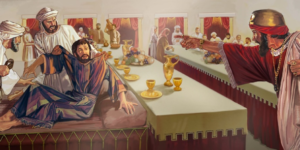 Paying the Tax to Caesar.
Paying the Tax to Caesar.
Once again, the Pharisees are examining the Lamb, trying to trap Him and find a blemish of fault in Him. This time the Pharisees team with the Herodians. They were normally at odds with each other, but united in their desire to want to do away with Jesus. The Herodians wanted to prove that He disrespected Roman authority. The Pharisees wanted to prove that He was not truly devoted to the Kingdom of God because He deferred to Rome by furnishing taxes.
Their question: “Is it right to pay the imperial tax to Caesar or not?” To say, “Yes, it is right to pay the imperial tax to Caesar,” would condemn him in the eyes of the Pharisees. To say, “No”, would condemn him in the eyes of the Herodians.
But Jesus turns their plot on its head by exposing their hypocrisy. Jesus asks for them to produce the coin used for paying the tax. Notice that Jesus does not produce the coin. The Pharisees condemn themselves as paying tribute to Caesar.
“Whose image and whose inscription is this?”
“Caesar’s” they reply.
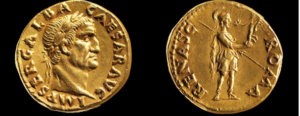 “So give back to Caesar what is Caesar’s, and to God what is God’s.” This comment puts the Herodians in their place for not being worshipers of the one true God who made us in His image and has given us His inscription. God’s true image and inscription was stamped on Jesus, and the Pharisees, were rejecting Him.
“So give back to Caesar what is Caesar’s, and to God what is God’s.” This comment puts the Herodians in their place for not being worshipers of the one true God who made us in His image and has given us His inscription. God’s true image and inscription was stamped on Jesus, and the Pharisees, were rejecting Him.
TODAY’S READING IN THE BOOK OF PSALMS- PSALM 27: 1-6
A PSALM OF FEARLESS TRUST IN GOD
As you pray this Psalm, you will note its confident tone (verses 1-3) and its single focus (verses 4-6).
 Because the Psalmist has set the Lord before his face as his light and salvation (v.1), even in the midst of life’s battles he can say, “I SHALL BE CONFIDENT!” (Psalm 27:3)
Because the Psalmist has set the Lord before his face as his light and salvation (v.1), even in the midst of life’s battles he can say, “I SHALL BE CONFIDENT!” (Psalm 27:3)
Verse 5 prefigures Christ’s finished work of redemption. We are to meditate upon the meaning of the sanctuary. We are hid with Christ in God (Colossians 3:3) through the work that Jesus accomplished as our Great High Priest. This is the secret place of His tabernacle in which we can rest. We are lifted by this revelation. He is our Rock and we share His victory over our enemies.
TODAY’S READING FROM THE BOOK OF PROVERBS: PROVERBS 6:20-26
The importance of hiding God’s Word in Your heart
Proverbs 6:20-26 20 My son, observe the commandment of your father and do not forsake the teaching of your mother; 21 Bind them continually on your heart; Tie them around your neck. 22 When you walk about, they will guide you; When you sleep, they will watch over you; And when you awake, they will talk to you. 23 For the commandment is a lamp and the teaching is light; And reproofs for discipline are the way of life 24 To keep you from the evil woman, From the smooth tongue of the adulteress. 25 Do not desire her beauty in your heart, nor let her capture you with her eyelids. 26 For on account of a harlot one is reduced to a loaf of bread, And an adulteress hunts for the precious life.
PRAYER- Lord, help us to internalize Your Word. May Your Word guide us, watch over us and may it dwell so richly in us that Your Holy Spirit causes the Word to speak to us throughout the day. May it illuminate our understanding and keep us from deception. Lord, give us this day our daily bread. Forgive us of our grumbling. Give us grateful, receptive hearts that are ready to do Your will, in Jesus’ Name. Amen.
Pastor David
